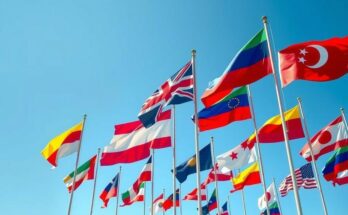Greenland’s recent elections resulted in the right-wing parties Demokraatit and Naleraq unseating the left-wing ruling coalition amid rising U.S. interest, particularly from President Trump. Jens-Frederik Nielsen, leader of Demokraatit, stresses economic stability and unity in coalition negotiations. While both parties advocate for independence, they differ in their approach, focusing on economic self-sufficiency first. The changing political dynamics spotlight Greenland’s strategic location and rich resources as integral to future governance and international relations.
Greenland’s recent parliamentary elections signify a dramatic political shift as right-wing parties Demokraatit and Naleraq gained substantial support, thereby ending the ruling left-wing coalition. This change arises amid heightened U.S. interest in Greenland, particularly from President Donald Trump, who previously expressed a desire to control the island due to its strategic location and rich mineral resources.
Jens-Frederik Nielsen, the leader of Demokraatit, emerged as a crucial figure, calling for stability in U.S.-Greenland relations and national unity. His party, which secured 30% of the votes, emphasized the need for pragmatism as they approach coalition formation. Conversely, the former ruling parties, Inuit Ataqatigiit and Siumut, garnered only about 21% and 15% of the votes, showing a significant decline in their support.
During a time of heightened international interest, particularly from the United States, Greenland’s politics is more complex. Trump’s focus has shifted to Greenland due to its untapped natural resources, which have become increasingly accessible due to climate change-induced ice melt. Voters express concern about prioritizing economic stability alongside aspirations for independence from Denmark.
The political landscape shows that while both Demokraatit and Naleraq support the idea of independence, they propose differing strategies. Demokraatit advocates achieving economic self-sufficiency prior to independence. This cautious approach resonates with many Greenlanders, leading to calls for unity and negotiation among varying political parties.
The economic plight of Greenland’s fishing industry, exacerbated by a controversial fisheries law, has galvanized voters toward a desire for change. Concerns about livelihood, healthcare, and the overall economic landscape contributed to discontent with the previous coalition.
As coalition negotiations commence, Demokraatit is likely to pursue a business-friendly agenda aimed at fostering economic growth and independence, which reflects broader aspirations of the Greenlandic populace. The changing political dynamics signal both uncertainty and the potential for evolution in how Greenland navigates its future in a world of increasing geopolitical interest.
The recent elections in Greenland reveal a substantial shift towards right-wing governance, primarily driven by concerns over economic stability, independence, and international relations. With the election of Demokraatit and impending coalition talks, the new leadership is tasked with balancing aspirations for economic independence alongside the growing external interest influenced by U.S. politics. The evolving political landscape promises a critical period for Greenland in establishing its role in global geopolitics and managing its rich natural resources responsibly.
Original Source: www.aa.com.tr




